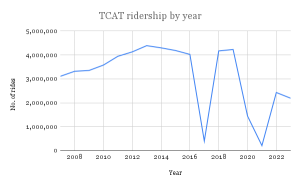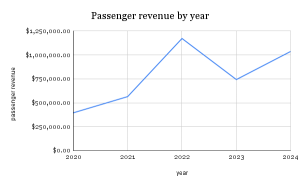
Cornell sophomore Abigail McCarthy, who uses Tompkins Consolidated Area Transit (TCAT) frequently, said she has noticed a substantial number of fareboxes that are “out of order” but still allow students to ride the routes.
“I have seen multitudes of students board the TCAT without paying as the boxes are often out of order, allowing the buses to run for hours at a time without pay if fares are not collected,” McCarthy said.
In August 2023, TCAT replaced its farebox system and equipment, which has resulted in ongoing issues as the system’s bugs are being fixed.
The fare system includes the physical machine on each bus that riders use to pay, fare media like Tcards and the digital software.
While McCarthy has noticed physical issues with the equipment, even with running fareboxes there is a delay that causes the system to not read a Tcard’s balance in real time.
The TCAT website states that the farebox will only show if the card is valid and not the balance. However, old Tcards are swiping through the new farebox regardless of the card’s value. A TCAT representative said they do not expect a significant loss in fare income despite some misuse during this adjustment period.
Fare system bugs
Patty Poist, communications and marketing manager at TCAT, said there were several issues that came up once the new Fast Fare Fareboxes were installed. One issue was a delay in getting new fare media, which includes smart cards and mobile pay capability, because of the ongoing effects of the pandemic supply chain shortages. The smart cards are made specifically to interact with the hardware in the new fareboxes.
The old mag-stripe Tcards are able to be read on the new fareboxes but Poist said the TCAT has been aware of a delay between the time a Tcard is swiped on the bus and the time a ride is deducted from it.
“Obviously, it wouldn’t be in the best interest of our business for us to reveal the exact length of the time lapse; ostensibly someone could use a blank Tcard to ride the bus,” Post said.
Fourth Ward Alderperson Tiffany Kumar said she has heard of the Tcard issue but that it has not been brought up formally in any council meetings. Two other council members confirmed this was not known information and that the council had not discussed it.

What is TCAT doing about it?
Poist said the TCAT hopes to have the new fare media available by the end of Spring 2024 but some troubleshooting is to be expected.
“Right now, we are spot checking individual cards, each of which has an identifier number on the back,” Poist said. “If we determine misuse, we will deactivate that card immediately. So again yes, a rider could try and use a card whose rides have not yet been deducted, but they run the risk of it being rejected at the farebox.”
She said that once the smart cards are available and Tcard balances are transferred, TCAT will see how many rides have been taken on each card and compare it to the original balance.
“We are confident that most of our riders adhere to the honor system in paying their fares, so we don’t expect to see a huge loss in revenue from misuse,” Poist said.

After confirming the system bug, Poist said no TCAT staff would be available for a follow up interview. She did not respond to further questions.
TCAT funding and model
The TCAT has three main partners that fund its business: the City of Ithaca, Tompkins County and Cornell University. As a nonprofit, TCAT has a board of directors, which is made up from nominated representatives from each of its main funding partners. However, TCAT and the board of directors are fully independent from those partners.
The TCAT also receives state and federal funding for much of its operations. Every couple of years the Ithaca-Tompkins County Transportation Council is assigned a certain amount of money that it must allocate to transit programming. All funding requests and projects are documented in the Transportation Improvement Program (TIP).
The funding needed to purchase and replace 55 fareboxes, system equipment and software was a one-time allocation of $1.5 million, according to the TIP. Money needed for continuous adjustments and troubleshooting is included in annual general maintenance.
Fernando de Aragón, executive director of the Ithaca-Tompkins County Transportation Council, said that the hardware and labor expenses for ongoing implementation of the farebox system is included in the original purchase.
“You buy something like this, you’re buying a contract from a provider,” de Aragón said. “I expect that that type of troubleshooting during setup is part of the contract with the company that they’re working with.”






